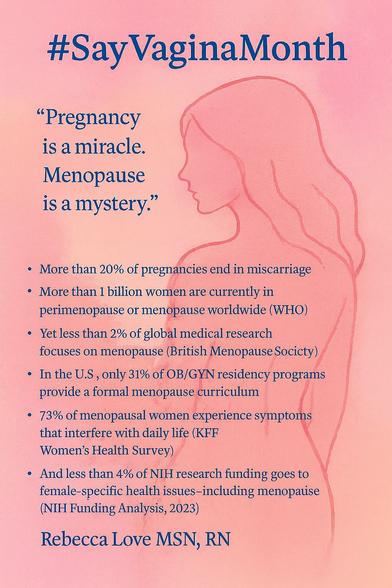
August is #SayVaginaMonth. | Rebecca Love RN, MSN, FIEL
August is #SayVaginaMonth. It is a topic we must be discussing. Thank you to Saundra Pelletier who started this movement.... No more vague language for women that: “Pregnancy is a miracle. Menopause is a mystery.” (because we simply have never studied it...) I want to share my personal story: In my life I experienced 2 miscarriages, both times I was told, this just happens. I learned we spent more money studying miscarriages in race horses, than we did in miscarriages in women. I let it pass...they said - keep trying - and we did and I am fortunate to be a mom of 3. It has been years since I have really thought a lot on that experience, but I experienced a similar one recently, at a different phase in life: Earlier this year, when I first started noticing changes, disrupted sleep, shoulder pain, brain fog, mood swings and exhaustion that felt unfamiliar, I did what I always tell others to do: I saw my doctor. I explained what I was feeling. I suspected it might be hormonal, related to perimenopause. The solution offered? A prescription for antidepressants and gabapentin. There was no real conversation about menopause. No lab work. No discussion of hormone therapy. And I’m a nurse. As I stood to leave, my doctor quietly turned off her medical scribe and said: “Look, to be honest, this is standard practice. But I know there are other ways, you might just need to speak with others.” So, I didn’t fill the prescription. Instead, I started asking questions. I reached out to colleagues. I listened to other women going through the same transition. That’s when I found the Midlife Women’s Health Clinic at Massachusetts General Hospital, a clinic led by nurse practitioners who were doing something different. They were recognizing the role of declining hormone levels in perimenopause and addressing them directly, with thoughtful, evidence-based care. Here’s what the broader data tells us: - Nearly 20% of pregnancies end in miscarriages. (March of Dimes) -More than 1 billion women are currently in perimenopause or menopause worldwide (WHO). -Yet less than 2% of global medical research focuses on menopause (British Menopause Society). -73% of menopausal women experience symptoms that interfere with daily life (KFF Women’s Health Survey). - And less than 4% of NIH research funding goes to female-specific health issues, including menopause (NIH Funding Analysis, 2023). The reality is - Women's Health needs to be addressed - because too often, we don’t talk about it until women are already in crisis. #SayVaginaMonth is a call to treat women’s health - across all stages of life - with the respect and resources it deserves to change the national narrative around women. We can’t care for what we won’t name. We can’t treat what we don’t understand. And we won’t change outcomes unless we change the conversation. #SayVaginaMonth #NursesOnLinkedIn #HealthcareOnLinkedIn #Menopause #Miscarriages #WomensHealth